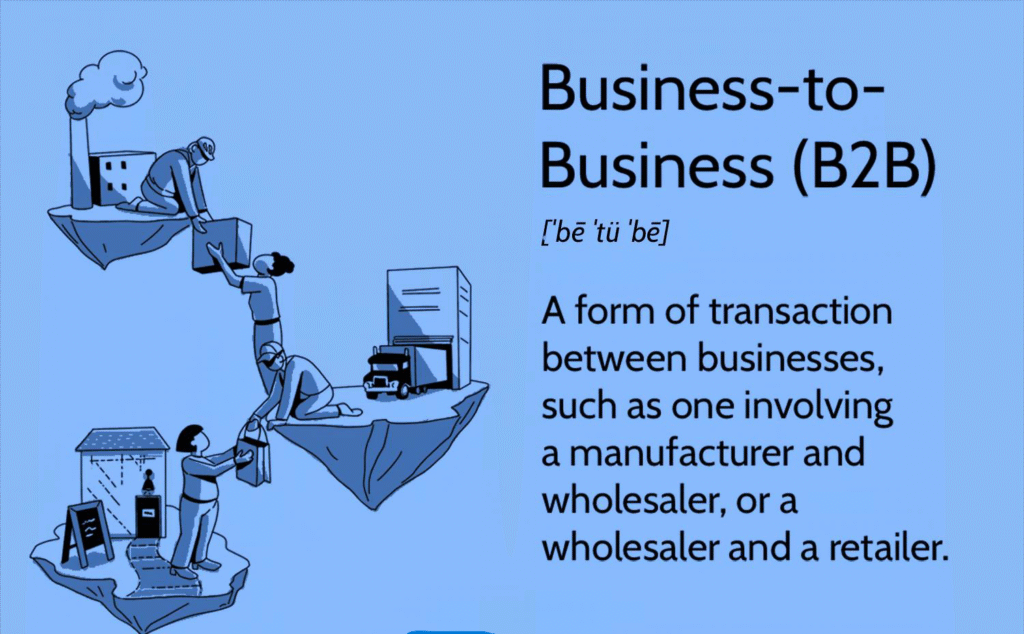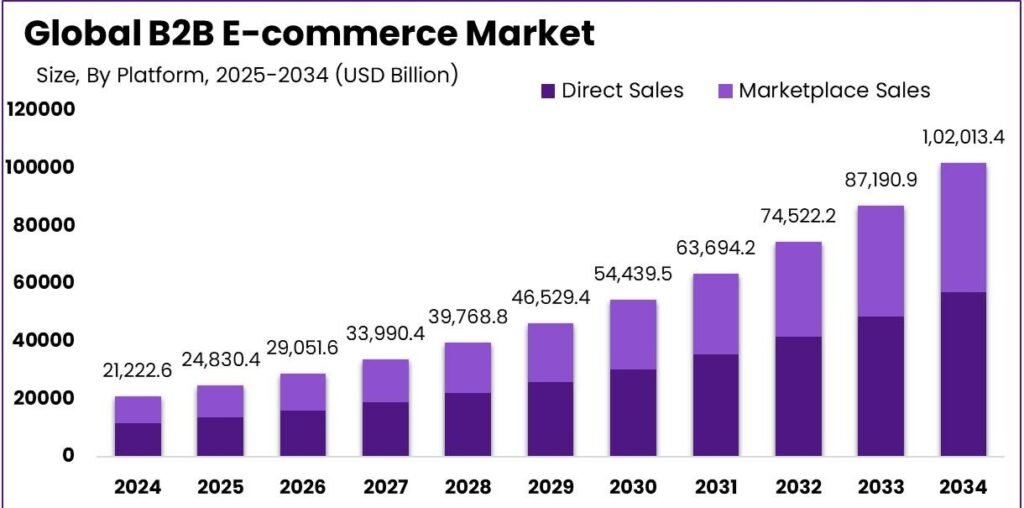With the increasing digitization of business processes, B2B e-commerce has become a powerful platform for companies to conduct transactions online. This trend is reshaping how businesses connect, negotiate, and execute deals. Understanding the B2B e-commerce advantages and disadvantages is essential for companies that want to leverage this digital transformation effectively.
In this article, we will explore the key B2B e-commerce advantages and disadvantages, helping your organization make informed decisions about adopting or improving your B2B online sales channels.
What is B2B E-commerce?
Before diving into the advantages and disadvantages, it’s important to define B2B e-commerce. It refers to electronic transactions conducted between businesses via an online platform rather than traditional physical methods. This can include wholesale trade, supply chain management, and procurement through digital marketplaces or direct company websites.

B2B E-commerce Advantages and Disadvantages: Overview
Advantages of B2B E-commerce
- Increased Market Reach and Sales Opportunities
One of the most significant B2B e-commerce advantages is the ability to access a much broader market beyond local or regional boundaries. Digital platforms allow businesses to connect with suppliers, distributors, and buyers worldwide, which translates into new growth opportunities. - Cost Efficiency and Reduced Operational Expenses
Online transactions reduce the need for physical storefronts, printed catalogs, or direct sales staff, lowering overhead costs. Automation of ordering, invoicing, and payments also decreases administrative workload and human error. - 24/7 Availability and Convenience
Unlike traditional business hours, B2B e-commerce platforms are operational 24/7, enabling buyers and sellers to interact at any time. This flexibility improves customer satisfaction and speeds up the sales cycle. - Enhanced Customer Experience and Personalization
Modern B2B e-commerce platforms offer personalized experiences through tailored pricing, custom catalogs, and order histories. This level of customization leads to stronger customer relationships. - Improved Data Analytics and Business Insights
Digital transactions generate valuable data that companies can analyze for trends, customer behavior, and inventory management. This insight helps optimize marketing strategies and supply chain management. - Faster Transactions and Streamlined Supply Chains
The automation embedded in B2B e-commerce facilitates quicker order processing and fulfillment, accelerating the entire supply chain and improving overall efficiency. - Integration with ERP and CRM Systems
Many B2B e-commerce solutions integrate seamlessly with Enterprise Resource Planning (ERP) and Customer Relationship Management (CRM) systems, allowing for centralized management of business processes.
Disadvantages of B2B E-commerce
Despite the compelling B2B e-commerce advantages, there are challenges and risks companies need to consider:
- High Initial Setup and Maintenance Costs
Developing a robust and secure online platform involves significant upfront investment. Maintenance, security updates, and technology upgrades add to ongoing costs. - Complexity in Technology Integration
Integrating e-commerce platforms with existing ERP, CRM, and supply chain systems can be technically challenging, requiring specialized knowledge and resources. - Security Concerns and Data Privacy Risks
Handling large volumes of sensitive business data online exposes companies to cybersecurity threats, requiring solid protection measures which can be costly and complex to implement. - Potential Loss of Personal Touch
Some B2B transactions still rely heavily on personal relationships and negotiations. Moving fully digital can risk losing the personal interaction valued by certain customers. - Dependence on Internet Connectivity
A stable and fast internet connection is essential. Any downtime or connectivity issues can disrupt operations and cause lost sales. - Resistance to Change from Traditional Buyers or Sellers
Not all stakeholders may be comfortable or familiar with online processes, potentially slowing down adoption of B2B e-commerce solutions. - Competition and Pricing Transparency
Online marketplaces increase market transparency, which can lead to more competitive pricing but also pressure on profit margins.
How to Maximize the B2B E-commerce Advantages and Minimize Disadvantages
- Invest in Scalable and Secure Technology
Choosing the right platform that can grow with your business and has strong security protocols is crucial. - Focus on User Experience and Customer Support
Ensure your e-commerce site is user-friendly, with clear navigation and responsive customer support to reduce friction. - Train Your Teams and Educate Clients
Provide necessary training to internal teams and customers to ease the transition to online systems. - Use Data Analytics to Inform Decisions
Leverage collected data to anticipate market trends, manage inventory smartly, and tailor marketing campaigns. - Maintain Personal Relationships Where Needed
Combine digital processes with personal interactions via account managers or customer service calls to maintain trust. - Regularly Update Security Measures
Stay ahead of cybersecurity threats through continuous monitoring and updating of defense mechanisms.
Future Trends in B2B E-commerce
The B2B e-commerce advantages and disadvantages will continue evolving as technologies like artificial intelligence, machine learning, and blockchain gain traction. AI-powered chatbots and personalized product recommendations will enhance user experience. Blockchain can improve transaction security and supply chain transparency.
Embracing these changes while mitigating the common pitfalls will define successful B2B companies in the years to come.

Enhance your digital presence with our professional e-commerce services, designed to help businesses build scalable, secure, and high-performing online platforms.
Final Thoughts
In conclusion, understanding the B2B e-commerce advantages and disadvantages is essential in navigating the digital transformation of business procurement and sales. The numerous benefits, including expanded market reach, cost efficiencies, and improved customer experience, are significant incentives for adoption. However, challenges such as initial costs, security risks, and integration complexity require careful planning and strategy.
By leveraging best practices and investing in technology and training, businesses can maximize the advantages of B2B e-commerce while minimizing its downsides.
FAQ About B2B e-commerce
- What is B2B e-commerce, and how does it differ from B2C e-commerce?
B2B e-commerce (Business-to-Business electronic commerce) refers to the online transaction of goods, services, or information between businesses rather than between a business and individual consumers. It involves companies buying from and selling to each other through digital platforms.
- What types of transactions can be performed through B2B e-commerce platforms?
B2B e-commerce is not limited to wholesalers only. It supports a wide range of intercompany trade transactions such as wholesaler-distributor-dealer management, financial transactions, order processing, invoicing, and inventory management. Essentially, most business processes can be facilitated online through B2B software
- What payment options are typically available in B2B e-commerce?
B2B platforms commonly offer multiple payment methods including credit cards (via virtual POS), money transfers or EFT integrated with accounting systems, invoicing options, and sometimes cash/check entries integrated with accounting software. This flexibility caters to the varied needs of business customers.
- Is specialized computer knowledge required to use B2B e-commerce software?
No, basic computer skills are generally sufficient to manage B2B e-commerce platforms. These systems are designed to be user-friendly so that business users and their customers can easily access and track transactions with minimal training.
- How can B2B e-commerce platforms support complex sales processes?
B2B e-commerce platforms are tailored for complex sales processes involving multiple approval steps, negotiation phases, price personalization, and multi-user order collaboration. Features like user group management, personalized pricing tiers, online price negotiation, reorder options, and advanced search mechanisms enable handling complex B2B workflows smoothly.
